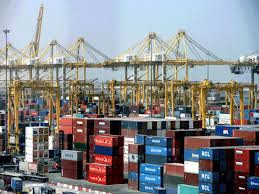Industry analysts say the preference by importers for ports of neighbouring countries can only be checked if the indices of conducive business environment (strong currency, high turn-over rate of cargo) favour the maritime business in Nigeria.
Hit by a
wake-up call to develop the non-oil sector of the nation’s economy following
the steady decline in international oil prices, Nigeria’s loud clamour for
reforms in the maritime sector was welcomed with high expectations.
oil prices, to below $50 however, led to a significant reduction in
government’s expenditure and fixed investments in 2015, with a saddening lean
foreign reserves.
statistics showed that the foreign reserves of Nigeria dipped from a value of
$40.6bn in Jan 2014 to $28.3bn in June 2015. Shortly after then, the level of
external reserves was equivalent to 7.1 months of import commitment, and could
also finance 6.8 months of foreign exchange disbursements or 5.2 months of
imports of goods and services.
be noted that Nigeria cannot completely stop importation of goods as about 50
per cent of imports are done for materials required for further production.
speculation that a continued downward trend in oil revenues and foreign
exchange receipts could lead to a situation of liquidity squeeze that would
adversely affect the economy in the medium term, has no doubt started staring
Nigeria in the face.
concern for the maritime industry is that it needs the ‘elusive’ exchange rate stability
to function competitively in the port operation and shipping sub-sector which
is global in nature and would strive where cost is relatively encouraging.
has not experienced any improvement considering that the gap between the
parallel and official exchange rate markets has continued to widen while
several parallel market rates are now in existence. This has further increased
the uncertainty of doing business in Nigeria for foreign investors.
doubt, there may be more pressure on the value of the Naira in the short-medium
term until the economy is able to diversify and reduce reliance on oil sector
earnings. But there isn’t a realistic encouragement for such non-oil sector
investment when existing businesses now face serious challenges repatriating
foreign currency meant for various bills.
the performance of the maritime sector over time, it has had significant impact
on the economy in terms of government revenue, improved trading affiliations
with other nations and other indirect impacts which include job creation. Available
records show that the Nigerian maritime sector accounts for over 50% and 80% of
the value of West Africa’s imports and exports respectively (NBS).
2006 port concession resulted in significant improvements in the Nigerian port
operations; there has been the emergence of larger vessels with improved cost
effectiveness, improved cargo-handling technology and delivery speed, as well
as reduced unit freight cost. In addition, the concession increased Nigeria’s
port competitiveness, reduced waiting time for ships, and enhanced movement of
goods across international borders and offshore manufacturing.
it is very important that the maintenance of port infrastructure is sustained
for the ports to remain competitive. It is not enough to just count what the
concession did 10 years ago, as the sector is now faced with challenges of
traffic gridlock at the ports, uncertainty of policy direction, with
non-passage of industry legislative bills like the ports and Harbour bill.
challenges include blurred assignment of regulatory functions, amongst others.
As a result of these challenges, the business environment has not enabled the
industry to reach its full potential as the hub of maritime in the West African
region.
noteworthy that as Nigeria is beginning to put in place several strategies to
reform the non-oil sector of the economy in order to diversify its revenue base
and promote local production of goods which could be exported, many of the
goods will rely on an efficient ports system for it to be efficient and
globally competitive.

